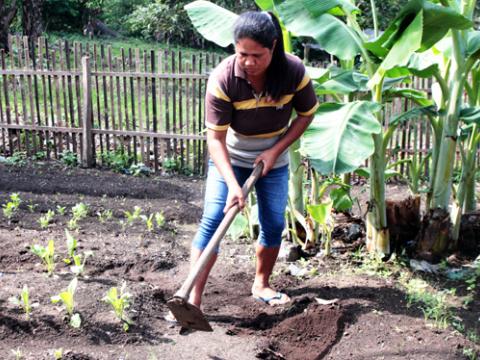Communal garden for education

School is not just a place for students to meet and learn, it is also about parent’s involvement. In Seki primary school located in North Halmahera district, North Moluccas province of Indonesia, teachers and parents work each other to support student’s education.
With the assistance of World Vision Indonesia, parents meet on a school committee. In this committee, they don’t only hold regular meetings but also do something for school. Since almost all areas in North Halmahera are favored with fertile lands, parents work together to build and manage school garden.
“In school committee, we have an initiative to manage the school garden. We grow vegetable plants there and mutually weed and care for them,” said Elizabeth, 40, a member of school committee.
Crops are sold and the sales revenue is used for school needs.
Together with other parents Elizabeth usually comes to school every Wednesday and Friday to weed the garden which lies behind school building. Teachers also take care of the garden during school hours.
Once during the semester, parents harvest vegetables like eggplant, chili, spinach, and lettuce. The crops are distributed to all parents who join the school committee. Some crops are even sold and the sales revenue is used for school needs. The purpose of this school garden is to make parents aware of their children’s nutrition and have initiative to build their own business especially in agricultural sector.
"This activity actually has taught us about mutual cooperation because we all do this for our children."
By managing the school garden for almost four years, school committee including parents have successfully built school fence using self-funding.
“This activity actually has taught us about mutual cooperation because we all do this for our children,” Elizabeth concluded.
World Vision Indonesia through Contextual Education program has assisted the school since 2011. The program promoted the involvement of parents in school committee and also advocated teachers to be more creative at school by implementing local culture in class activity.
The program has benefited primary school students in three sub-districts of North Halmahera district since 2011.
Written by: Rena Tanjung, Field Communications Officer, Wahana Visi Indonesia